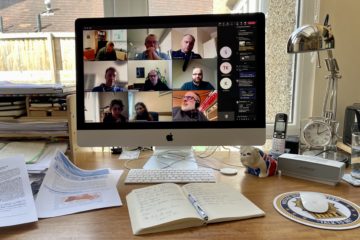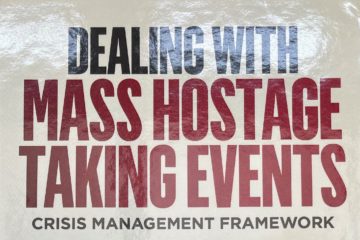Global Humanitarian Response to COVID-19 – a perspective from a faith-based INGO
Published by Andrew B Brown on
Across the developed world the response to COVID-19 has been swift with some governments quickly moving to enforced lockdown of the populous to slow down the transmission of the virus. Unfortunately, not all governments are the same with some countries in denial, which in today’s connected world, causes the population to read wider, distrust their own government and fuels panic within communities.
Working as the Chief Security Officer for a faith-based INGO operating at the forefront of the global refugee crisis across 56 countries has its challenges from responding to kidnap, crime, terrorism, civil disorder, natural disasters and even the response to the outbreak of Ebola in DRC in how to keep staff safe.
Naturally, there are significant challenges in persuading senior leaders within a faith-based organisation that crisis leadership and management should be part of their suite of skills to respond effectively to a variety of crisis that impact on our mission. The skills I’ve learned as a negotiator from the world of hostage/crisis negotiation have served me well in persuading the organisation to move their focus to one much more of resilience.
Establishing a Cross-Functional COVID-19 Response Team across the organisation has allowed us to be assured that across our regions we have responded appropriately to protect staff, moving quickly to remote/home working and many of our educational activities have been suspended or stopped through in country government directive. In countries that are in denial we have utilised the World Health Organisation website as a go to resource for staff to ensure that they get accurate information as they raise awareness and implement preventative measures across our missions. Consistency and frequency in our communications is key to ensure staff are given the right message and that we reassure donors that support our activities, that we are responding appropriately and looking at short, medium- and long-term challenges as we move through this pandemic.
Staff not only feel the discomfort of lockdown or self-isolation, but also feel cut off from refugees and migrants that we support usually face to face as detention and reception centres are closed to outside visitors where activities are reduced to life saving ones only. Frustrating as it is, it opens opportunities to be innovative in how we support remotely, with staff establishing talk groups on WhatsApp to continue to support those who need us the most. Recognising the challenges that we face many donors and foundations have come forward to offer financial support as many government grant processes are slowed as the focus shifts to COVID-19 response.
In an organisation adverse to the term of ‘crisis management’ using a cross-functional COVID-19 response team receives more acceptance and allows us to discuss some of the greater challenges we face. As yet unknown is the impact on refugee and internally displaced people (IDP) populations as the virus continues to gather momentum across the globe in its contagion. Basic preventative measures of handwashing and social distancing in refugee & IDP settings are almost impossible to implement; so, what is the next best thing we can do to support staff in the field? With a global shortage of hand sanitiser and protective equipment, we now see commercial enterprise, even gin distilleries switching to the production of hand sanitiser. In this short window, we have the opportunity to prepare and focus our efforts on supporting staff in the field in order that they continue to deliver to our service of serving, accompanying and advocating for those most in need in our global human community.
As an international organisation we have experience of operating in an Ebola setting and our strategy to COVID-19 has been to:
- React quickly;
- Go after the virus through educational awareness and prevention to stop the chains of transmission;
- Engage deeply with the communities that we serve knowing that community acceptance of how we react is hugely important;
- Be co-ordinated and coherent in our actions & communication;
- Consider other sectoral impacts as we navigate this pandemic.
I have steered our cross-functional COVID-19 response team to the wise and experienced words of Dr Michael Ryan, Executive Director of the World Health Organisation:
“Be fast, have no regrets, always be the first mover and need to be prepared. If you need to be right before you move, you will never win. Perfection is the enemy of the good when it comes to emergency management. Speed trumps perfection.
The problem in society is everyone is afraid of making a mistake, afraid of the consequence of error. The greatest error is not to move. The greatest error is to be paralysed by the fear of failure…”
No doubt this is going to be tough, but our resilience, professionalism and faith will help us navigate the bumpy road ahead.


